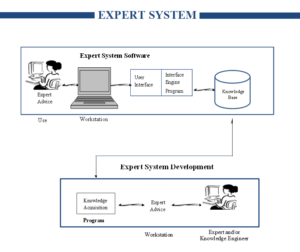
Home » What are the Components of Expert System (ES)?

An expert system (ES) is a knowledge-based information system that uses its knowledge of a specific, complex application domain to act as an expert consultant to end users. An expert system provides answers to questions in a very specific problem domain by creating human interfaces about the knowledge contained in a specialized knowledge base. They must also be able to explain the reasoning process and conclusions to the user. The expert system can thus provide end-users with decision-making support in the form of advice from an expert consultant in a specific problem area.
A related term is wizard. A wizard is an interactive computer program that helps the user solve a problem. Originally, the term wizard was used for programs that construct a database search query based on user-supplied criteria. However, some rule-based expert systems are also called wizards. Other “Wizards” are a series of online forms that guide users through a series of options, such as those that guide the installation of new software on computers, and are not Expert Systems. In the core syllabus of Computer Science Engineering (CSE), students learn about expert systems and their applications.
The components of an expert system include a knowledge base and software modules that perform knowledge inference in the knowledge base and communicate answers to the user’s questions.
Below are the following components:

The knowledge base of an expert system contains: (1) facts about a specific subject domain (for example, Ramesh is an analyst) and (2) heuristics (rules of thumb) which express the thought processes of a subject matter expert (for example, IF Ramesh is an analyst THEN he needs a workstation) .
There are many ways to represent this knowledge in expert systems. Examples are rule-based, framework-based, object-based, and case-based knowledge representation methods.
• Rule-Based Knowledge:
Knowledge represented in the form of rules and statements of fact. Rules are statements that usually take the form of a premise and a conclusion, such as: If (condition), Then (conclusion).
• Framework knowledge:
Knowledge represented in the form of a hierarchy or network of frames. A frame is a body of knowledge about an entity consisting of a complex package of data values describing its attributes.
• Object-based knowledge:
Knowledge represented as a network of objects. An object is a data element that includes both data and methods or processes that act on that data. (A Complete Guide of Data Mining)
• Casee-Based Knowledge:
Representation of knowledge in the knowledge base of an expert system in the form of cases, which are examples of past performances, events and experiences.
An expert system software package contains an inference engine and other programs to refine knowledge (such as rules and facts) related to a particular problem. It then makes associations and inferences that lead to recommended actions for the user. User interface programs are also needed to communicate with end users, including an explainer program that explains the reasoning process to the user upon request.
Knowledge acquisition programs are not part of an expert system, but are software tools for developing a knowledge base, as well as expert system shells that are used to develop expert systems.
From
Prof.(Dr.) Ritu Sindhu
Professor and Associate Dean
School of (CS&IT)
Lingayas Vidyapeeth
Colleges in Faridabad for M.Tech CSE
RECENT POSTS
CATEGORIES
TAGS
Agriculture Agriculture future AI Architecture artificial intelligence Bachelor of Commerce BA English BA Psychology BTech AIML BTech CSE BTech Engineering Business management career Career-Specific Education career guide career option career scope Civil engineering commerce and management Computer Science Computer science engineering Data science degree education Engineering Engineering students English Literature english program Fashion Design Fashion design course Higher Education Journalism journalism and mass communication law Law career Machine Learning Master degree mathematics MBA MBA specialization Mechanical Engineering Pharmacy Psychology Research and Development students
University Address: Nachauli, Jasana Road, Faridabad, Haryana
For Admissions :
Toll Free: 1800-120-4613
Mobile : 8447744303 | 8447744304 | 8447744306 | 8447744309
8700003974 | 8700003411 | 8700003749
Address: C-72, Second Floor, Shivalik, Near Malviya Nagar,
Above HDFC Bank, New Delhi 110017
Landline No. - 011-46570515 / 45138169 / 41755703
Mobile No. - +91-7303152412 / +91-7303152420 / +91-9311321952
Jagmani Kutir, Ground Floor, Road No-1, Rajeev Nagar,
Near Darbar Marriage Hall, Patna-800024, Bihar
Contact No: 9818352069/ 8130120095
Mail: kanhaiya@lingayasvidyapeeth.edu.in
Copyrights © 1998 - 2025 Lingaya's Vidyapeeth (Deemed To Be University). All rights reserved.
It is important to note that the following email IDs and domains are fraudulent and do not belong to our university.
LV only conducts physical/online verification of any document related to examination on the following email id: